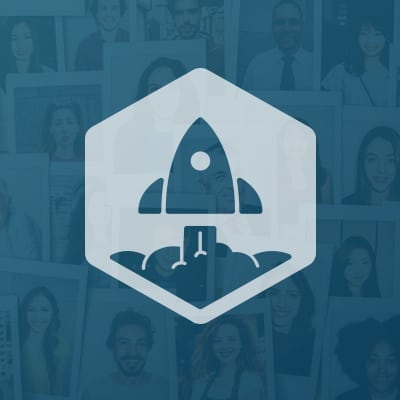From 0 to 1 million, 1 to 10 million, 10 to 100 million, and 100 million to now. Zendesk, a company with the lofty goal of making customer service and engagement enjoyable, has gone through many transformations to become the company it is today. Devdutt Yellurkar, General Partner at CRV, chats with Mikkel Svane, Co-Founder & CEO of Zendesk about the learnings throughout these different stages of growth and eventually going public.
Mikkel talks about the differences between hiring in Denmark and the US, how raising their prices almost killed their business, making a product as simple as possible and something more important than valuation.
Even with all the success Zendesk has achieved, Mikkel believes that the biggest hurdles are still in front of them – he and his team have high ambitions for the future of the company.
And if you haven’t heard: SaaStr Annual will be back in 2018, bigger and better than ever! Join 10,000 fellow founders, investors and execs for 3 days of unparalleled networking and epic learnings from SaaS legends like Jyoti Bansal, Dustin Moskovitz, Jeff Lawson, and Michael Pryor. If you don’t have tickets, lock in Early Bird pricing today and bring your team from just $749! (All ticket prices go up September 1st.) Get tickets here.
TRANSCRIPT
Jason Lemkin: All right, let’s give it up for Mikkel and Devdutt. This is great, thank you.
Devdutt Yellurkar: Thanks, Jason, and thank you, Mikkel, for coming in.
Mikkel Svane: Maybe you should introduce yourself.
Devdutt: Maybe.
[laughter]
Devdutt: I’m not Stephen Colbert. This is Devdutt Yellurkar. I’m a venture capitalist and lucky to be one of the first investors in Mikkel’s company. I’ve known Mikkel for a long, long time now.
Mikkel: We were supposed to do this session today with Christoph Janz, who was the first angel investor in Zendesk. Christoph is German, based out of Germany, and unfortunately, he got sick right before leaving, so Devdutt very much agreed to take over and have this conversation with me instead.
Devdutt: I think most of these people know Christoph. He’s a prolific investor.
Mikkel: Christoph Janz, he’s now with Point Nine Capital, a venture seed, early stage VC company in Berlin.
Devdutt: How many of you know Christoph already? Great.
Mikkel: [laughs] Five.
Devdutt: Seven.
Mikkel: CRV, formerly known as Charles River Ventures, how many know that?
Devdutt: Maybe 10.
Mikkel: A few more.
Devdutt: Enough of the host introductions. I’m sure everybody here already knows about Mikkel and Zendesk, but why don’t you take a minute, Mikkel, to talk about Zendesk and what you’re all about?
Mikkel: Zendesk, we are a SaaS enterprise software company. We build solutions for customer service, customer engagement. We’ve been on this journey for almost 10 years now, and have close to a 100,000 businesses around the world using our software for providing great customer service, great customer engagement.
We’ve been so fortunate to work with some of these fantastic companies here in San Francisco, Silicon Valley, fast growing startups that have changed the world and also changed how you think about customer service and customer engagement. We’ve been very fortunate and it’s been a really, really fun ride.
Devdutt: By the way, congratulations on your phenomenal results yesterday.
Mikkel: Yes, thank you. Now we are a public company, so we had our earnings yesterday. Thank you very much. We ended 2016 on a really, really good note, a lot of momentum in the business and the stock market reacted very positively to that.
Devdutt: That’s always good. For people who don’t know, $312 million in revenue in 2016. That’s about $310 million more than when Christoph and I met you.
Mikkel: Yeah.
[laughter]
Devdutt: There are lots of SaaS founders here today who would love to…It would be great to then talk about that journey from zero to now, zero to $312 million. I’m sure there are multiple lessons, anecdotes, funny and not funny that can be shared by you.
Mikkel: Terrible, terrible things I can never share.
Devdutt: By the way, Mikkel has written a fantastic book, I must plug it. If you have not read it, everybody should go get a copy. It’s called Startupland. It describes the journey from the founding of the company all the way to the IPO.
Before we dive in, Christoph told me that he has access to an email from 2008 when you were just starting. When one of your co founders, Morten, said that he can’t believe this thing is going to get more than $100 million. I think he was talking about valuation.
Mikkel: I’m not sure.
Devdutt: What about that? What’s going on there?
Mikkel: No, but I think that’s a good description of what happens in the very early stage of a startup that where part of you is incredibly confident about what you’re doing and the sky is the ceiling and everything.
Part of you is just like, “Oh my God, I can’t even pay my bills. How we’re ever going to make money out of this?”
I think it’s a good email to symbolize the most internal conflict you have as early founders of a company. It’s also a good email that it’s just like, “He should never like, fucking co-founders.” Like, “Why does he write an email like that?”
[laughter]
Devdutt: When did you guys know? What was that moment when you knew that this could become big?
Mikkel: I think that’s interesting. I think maybe when you see us from the outside and now we’re a big public company and blah, blah, blah. You feel like we to some extent made it. Except, we still have that startup mentality. We still feel that we have our biggest opportunities, our biggest struggles.
We have our biggest hurdles in front of us. We have high ambitions. We believe that’s a huge opportunity, but to continue to execute on that, it’s going to be a lot more work. I think it’s a good thing in a company to never really feel that you made it or that you made it big.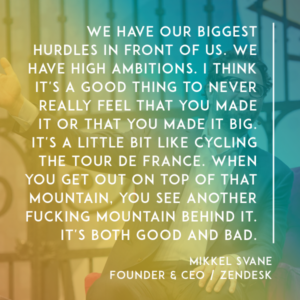
It’s a little bit like cycling like these guys that take the Tour de France or whatever. It’s like every morning, it’s just a new mountain there. When you get out on top of that mountain, there’s another fucking mountain behind it. It’s both good and bad.
Devdutt: [laughs] That’s fantastic. It’s been a long journey from 2008 to now. Let’s break it down into four segments, zero to one million. I think that’s pretty seminal. One to 10, 10 to 100, and 100 to today. Makes sense?
Mikkel: Yes.
Devdutt: Let’s start from the very beginning, zero to one. What are the most important lessons as you built that into the early days of Zendesk when you were in Copenhagen?
Mikkel: I think there’s different angles on that story on that early phase. I think one of the dynamics you have to deal tremendously with in that phase is just the pure founder dynamics. It’s a little bit like being in a relationship where you’re not really willing to commit.
Nobody kneels down and proposes. You’re all checking out all other opportunities out there. You’re not really willing to commit the same way. There’s a lot of those dynamics where you feel each other out a little bit and figuring out a way of trying and starting to believe in this.
I think there’s a lot of those dynamics in the early days. Also, there’s a lot of uncertainty. You have no idea what you’re doing. A lot of it is just instinct and gut, especially because we came out of Copenhagen. There’s not a startup tradition in Copenhagen.
It took us 18 months to get to our first million dollars in annual recurring revenue. That entire period in Denmark, we met almost nobody who believed in the idea. Nobody.
That’s uphill all the way. It wasn’t until we really got engaged with Christoph who’s done startups in the US before. We started to speak to American VCs. We actually started to believe in ourselves and started to believe that we have a model.
Devdutt: Talk about Christoph’s role in that, because I think a lot of people here who are entrepreneurs who bring on angels. He was so instrumental. When I remember meeting you, you were so much buttoned together because of Christoph. Tell us about that relationship.
Mikkel: I think that’s a really, really good point because when you are in that early stage, as a company, as a startup, you are incredibly fragile. There’re so many things that can go wrong, basically, every single day.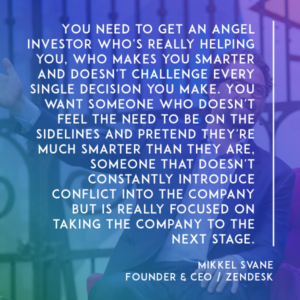
Getting an angel investor who’s really digging in, who’s helping you, who makes you smarter, who’s not just challenging every single decision you make, who doesn’t have a need to start being on the sideline and pretend they’re much smarter than they are, that doesn’t constantly introduce conflict into the company but really is all focused about taking the company ready for the next stage.
For him, for Christoph, it’s really about describing the business, putting together the basics of a business plan, showing what model we had for growing the business, and then helping us present that in a way so we could go out and talk to investors.
I think for us, I can’t value enough what he did for us because he made us understand a whole world that we knew nothing about. Talking to you, guys, when we first got introduced to CRV and making sure that it was a conversation where we understood each other and we had a common language and all these things. It’s been so incredibly important for us in that early stage.
I see so many examples with small startups where they get ruined by early angel investors who are spending all their time challenging the company and have their own agendas. Don’t focus on just making the founder great and building a great story.
We were incredibly fortunate to meet Christoph very early.
Devdutt: He’s a terrific guy.
Mikkel: I think also for you guys. It must have been…
Devdutt: Let’s talk about 2008 because you started the company in the middle of a shit storm in the VC world. Everybody was running for the hills. I remember a very popular VC put out, “RIP good times.”
[crosstalk]
Mikkel: …credit crunch.
Devdutt: Tell us what you were…That life.
Mikkel: That sucked. [laughs]
We had so many early indicators of people wanting to invest and then from one day to the other, it’s just like, all of that evaporated.
I remember a personal story where I was in the final stages with the VC, and everything was good. It was just final confirmation. We did the last meeting and were supposed to write the documents.
I was sitting down here. I was sitting at a hotel, two minutes from here in The Tenderloin, a place called Hotel Phoenix, it’s a great place, by the way, and I was just sitting there, waiting for the call, and the call just never came.
It was so demotivating, and then had to travel back to Denmark and talk to my two co-founders about, “Yeah, not this time,” and start all over.
It was an incredibly tough period to raise money in, but it also meant that, when we finally raised money, and finally did the move, we came out of a bad time, that gave us a lot of maneuver room, it gave us a lot of trajectory.
In many ways, what started as bad timing turned out to be good timing for us, because that’s also…
Talking about the move in 2008, we moved here early 2009. We could afford moving to San Francisco back then. [laughs] I don’t know how people do it today, because it’s incredibly expensive here.
Salaries, rents, everything, it’s such an expensive lifestyle in San Francisco. Back then, we still thought it was expensive, but compared today, it was nothing.
Devdutt: How did that happen? You had family, and you are grown up in Copenhagen. Getting everybody convinced, the three founders and their respective families, convinced to move over, how did that go?
Mikkel: It went.
[laughter]
Mikkel: It’s, of course, an incredibly taxing period, because you have to be 100 percent focused on your company, but then you also have to deal with three kids and schools and insurances, health insurance, I had no idea, what health insurance meant in the US, and all these practical things.
Doing all of these things at the same time is really, really hard, and I cannot recommend it, but at the same time, it is a once in a lifetime experience.
Devdutt: How was it, taking money from a VC, and then from multiple VCs?
Mikkel: Fucking V…no. [laughs] No, it was great, getting there and suddenly having money to execute, and moving forward and all these things, it was fantastic. I grew very lucky with the VCs that we got. You joined us as our series A investor and right after that, Peter from Benchmark joined us, that’s Peter Fenton from Benchmark, joined us in series B.
We had a fantastic team very early on, and from there, it’s always been…building an early, strong investor team is so important for attracting future investors. It went really well for us.
Devdutt: Any other anecdotes about, learning about whether products wins, something else wins?
Mikkel: That phase, we were part of the first wave of a new generation of companies that was all about the user experience. It was all about the design, simplicity of the product, removing friction, removing complexity out of the application, removing all the complicated framework, and making decisions for the user and so on, we were all about that.
Back then, there was a lot of external VCs that was like, “I don’t really get it. How does it become better just because it’s nicer and easier and slicker? That doesn’t necessarily mean better for the business, for the enterprise.”
It turned out that, that was really like we were part of that first wave, and we just doubled down on that.
In many ways, that also introduced our initial business model, just like making things easy for businesses to sign up, start using the software.
Devdutt: One thing that we found when we looked at you was that, you were so passionate about building a brand, and brand as an eventual moat for your business. How did you get that insight about investing so much in building that brand?
Mikkel: I think that had to do with the industry we were in, like customer service, business workflow systems, everybody hated that. [laughs] Even on the customer side, nobody ever looks forward to contacting customer service.
We really tried to say, “Let’s build a brand which is really about providing joy and enlightenment and tranquility and all these things, to that experience, something that is typically a very stressful, terrible experience, let’s bring in a completely different brand to that.” I think that’s why our brand got important.
Devdutt: We’ll switch to the next phase of the journey, because a lot of the entrepreneurs here…Jason was telling me that, he said, a big percentage of the entrepreneurs here are north of $1 million, and they are on this journey from 1 to 10.
That’s, I think, one of the most critical journeys as you become a serious business. Tell me about that, how long did it take, what were the stumbling blocks, what worked, what didn’t work?
Mikkel: There was a lot of serial trying and failing. Zero to one took us 18 months and one to ten took us another 18 months, and so of course it was a very, very busy 18 months.
It was all about starting to build some of the initial team. We didn’t really build a team until we moved to the US, so now we had to start build a team. Hiring, in San Francisco, where we had absolutely no network, that was incredibly hard.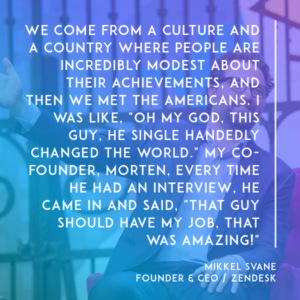
Also, hiring Americans was very new to us. We come from a culture and a country where you’re incredibly modest about your achievements, and then we met the Americans.
[laughter]
Mikkel: I was like, “Oh my God, this guy, he single handedly changed the world.”
[laughter]
Mikkel: My co founder, Morten, every time he had an interview, he came in and said, “That guy should have my job, that was amazing!”
[laughter]
Mikkel: We learned a little bit about differences and culture then. It was a lot of serial falling, getting up again, and working hard.
I think in that phase, it’s also like…everybody here talks about funnel models, and that’s the business model. Getting people to your website, getting them to easy to sign up or the points of engagement, getting them to try the product and converting them into customers, it’s the business model for 90 percent of the people in this room. Back then, that was all like, “Are you sure that’s a model?”
“Is that really a way to think about your business?” It felt very fragile and new and, “Was that a real thing?” It wasn’t until we were in that phase where we said, “Yeah, this is actually how lot of businesses are building their business.”
That realization that this very primitive way of thinking about your business was actually a subtle and simplification of a very subtle business model. We learned that in that phase.
Devdutt: Yeah, bringing some consumer techniques to enterprise, to business software was new in those days. I heard you had PTSD from one particular episode of…
Mikkel: [laughs] Yeah.
Devdutt: That, I think, it was…I still carry those T shirts, by the way.
[laughter]
Mikkel: Oh fuck. Yeah. It is one of these things and we embrace it today and really learned from it. We had a good idea to how we can make some more money. We could raise the prices for all our customers, [laughs] we thought that was a brilliant idea, because we’ve added all these new products and features and capabilities.
Of course customers want to pay more for that, so we just tried turning up the prices, and Jesus Christ, that almost killed us.
Devdutt: This was month to month prices, right?
Mikkel: Yeah. From one day to the other. Most customers heard like, “Oh, we’re raising prices, give us some more money.” That was first time we really realized how many customers we had and how vocal they could be.
[laughter]
Mikkel: You’re a cool startup and you’re sexy, and everybody thinks you’re like the shit, and then suddenly you have all your customers revolting, it’s like really, really traumatic for an organization.
Figuring out getting out of that and then regaining the trust of our customers, and I think that has been such a telling lesson for us, that the trust you have with your customers is so critical for your loyalty, for your evangelism, all these things that basically are the key growth drivers of a subscription based service.
It was a big lesson for us, it was hard for us, but I think we came out the other way so much stronger and really, really learned from it.
Devdutt: Mikkel, of course, from a culture perspective, takes things head on, and he started printing T-shirts with the stuff that came back, and most of them were vulgar, bad language.
[laughter]
Devdutt: I still have three T shirts with, “Tell your board to…”
Mikkel: “…go fuck…” yeah.
[laughter]
Mikkel: No, but we still wear them today because it’s a good reminder.
[laughter]
Devdutt: Let’s talk about 10 to 100, that was incredible. You did zero to one, 18 months, 1 to 10, 18 months, and how long did 10 to 100 take?
Mikkel: That took a little longer, I think, approximately twice as long, so about 36 months or three years. That was really about shifting gears for the business because until $10 million in run rate, we didn’t have sales, it was all a self service business. We doubled down on giving great customer service, of course, but we didn’t really have sales.
It was obvious that we could start scaling the business much faster if we hired sales, and we…
Devdutt: You had Jennifer Hanson.
Mikkel: [laughs] We had Jennifer Hanson, which was the customer service alter ego. We had this experience with a startup here in town that, a brand that we loved, that we had great connections with them and everything, and I heard from other sources, they were a little unsatisfied with us.
I looked into the history, and basically they had reached out to us 10 times, to ask for a demo, or ask about some help, or ask about how to do this and that, and every time we told them basically like, “If you can’t figure it out, we’re probably not the right product for you,” and I was like, “I’m not sure this scales.”
We started hiring salespeople that could really engage with these customers that needed some hand holding, needed demos, needed to negotiate, needed to understand the business, the product a little better, and needed to help them with scaling the product.
We started that journey. It’s a lot of injecting sales into an organization that never dealt with sales was hard, but that really, really helped us scale our business.
Devdutt: Self service is still the core, right, was still the core, from 10 to 100?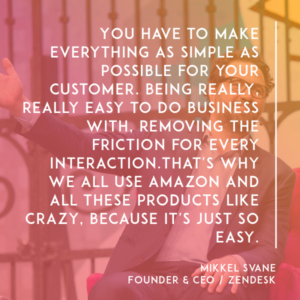
Mikkel: I think it’s very much the core of the DNA. You have to make everything as simple as possible for your customer. Being really, really easy to do business with, removing the friction for every interaction, that’s why we all use Amazon and all these products like crazy, because it’s just so easy.
That’s still very much core to our DNA, to our growth, and although we have…it’s more, if customers need help that we have help for them.
Devdutt: How did you go about breaking the product up for different segments of the market, because earlier you had, when we first met, you had one plan called the Startup Plan, $9 per seat. Now if you look at your 10 to 100 is when you started segmenting the market, segmenting the customer base, feature set, how did that go?
Mikkel: That, you have to try a lot. I think packaging and pricing is a constant exercise for a company today, because there’s always new things to answer to and new things to try, and new use cases, usage situations.
Being really flexible with your pricing and your packaging can be really, really competitively disruptive, that you can come with a price point, or you can come with a pricing model that works for your customer, that almost feels designed for their needs, is incredibly important.
That’s a good piece of advice for everybody who starts a business, for that scaling, build a model that really enables you to be very creative with your pricing and packaging.
Devdutt: When did you start putting an enterprise sales force? You began as an online model, then you built an inside sales team, when did you decide? What caused you to create an outside sales team?
Mikkel: I wouldn’t say we have a traditional, outbound, outside sales force, but we have this what we call a land and expand. We really try to land customers, frictionless, and then work with them to expand them within the organization.
That’s how we’ve grown into some amazing organizations over time, like our first Adobe customer was a small division in the UK, and now we have thousands of people within Adobe using our software.
Same with Disney and a lot of other organizations. That is how we focus our outbound or outside sales, if you will.
Devdutt: Now, tell me about…
Mikkel: By the end of that $100 run rate, that’s of course when we took the company public. [laughs]
Devdutt: Tell us about that, because I remember in 2014, there was a logjam. Nobody wanted to take their companies public, there was a big…actually you were the jam cracker, you broke that logjam, and were the first company to get out.
Mikkel: Yeah.
Devdutt: I know there are scars on your back because of it, though.
[laughter]
Devdutt: Why did you do that?
Mikkel: It’s very stressful to go through a period like that, because going public is something you start the process years in advance. You have to build a team, you have to hire the right people, the right executives, you have to start building relations with all the investors, you have to implement all these processes, these controls, and all this compliance stuff and all the legal work, and wow!
It’s so much work, and it can be a big distraction for a company.
Going out at a time where everybody’s like, “I’m not sure the timing’s right,” it’s just like, “Oh my God! Then what?” Basically, early on we made a decision and said, “We will go out because it’s the right thing for us to do, and then we have to figure out the market after that,” that was how we thought about it.
We went out, probably at a lower valuation than we could have gotten in a better market, but at the same time, who thinks about the valuation at the point of going public.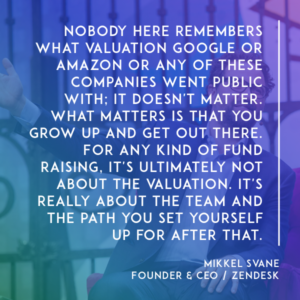
Nobody here remembers what valuation Google went public with, or Amazon, any of these companies, it doesn’t matter. What matters is that, you grow up, you get out there, and I think for any kind of fund raising, it’s ultimately not about the valuation. It’s really about the team and the path you set yourself up for after that.
Devdutt: That was 100, talk about 100 to now. What are the things that have changed and gotten better, gotten worse?
Mikkel: Everything has changed, of course, again, which is part of a high growth company. In 2016, we grew at almost 50 percent over 2015. That’s a lot of change, that’s a lot of turnover, that’s a lot of new people, that’s a lot of new customers, a lot of new processes. When you’re on a startup, a fast growing company, the company changes all the time.
Growing pre/post public, it’s a lot about execution. When you go public, you describe, “This is our business, this is we roll,” and then it’s about showing that you actually roll like that after the…
[crosstalk]
Devdutt: [laughs] …and quarter over quarter.
Mikkel: [laughs] Yes.
Devdutt: Mikkel, a few quarters ago, came out with a roadmap to get to a billion in revenue by 2020, right?
Mikkel: Yup.
Devdutt: I know that a very few SaaS companies who have gotten to a billion, so this will be incredible, but I think this is…as a VC, we see this as a huge opportunity for this generation of companies.
There are going to be many, many, many such companies that can get to it. What caused you to go set that goalpost?
Mikkel: I think that it’s part of getting everybody on the same page about our ambitions, and it’s also about setting something that you can refactor saying like, “To take us there, what do we need to do?” and then put a plan together that takes you through all the steps of getting there.
We see a huge opportunity in continuing to disrupt the enterprise software world. Everybody here who has a B2B startup, there’s a huge opportunity right now, because a lot of the established vendors are lagging tremendously behind.
You have a whole new generation of much more consumer friendly, consumer oriented CIOs and executives out there, who thinks much more about agility, who thinks much more about trajectory, than they think about, “Can I build everything with this application I put in house?”
It’s a huge opportunity and we look very much forward to executing on that.
Devdutt: Great. I think we are at 0.00.
Mikkel: Totally out of time here. [laughs]
Devdutt: Thanks again, guys. Thanks again, Mikkel. Thanks for making it.
Mikkel: Thank you. Thanks, everybody. Thanks, Devdutt
[applause]
Devdutt: Thanks, guys.

